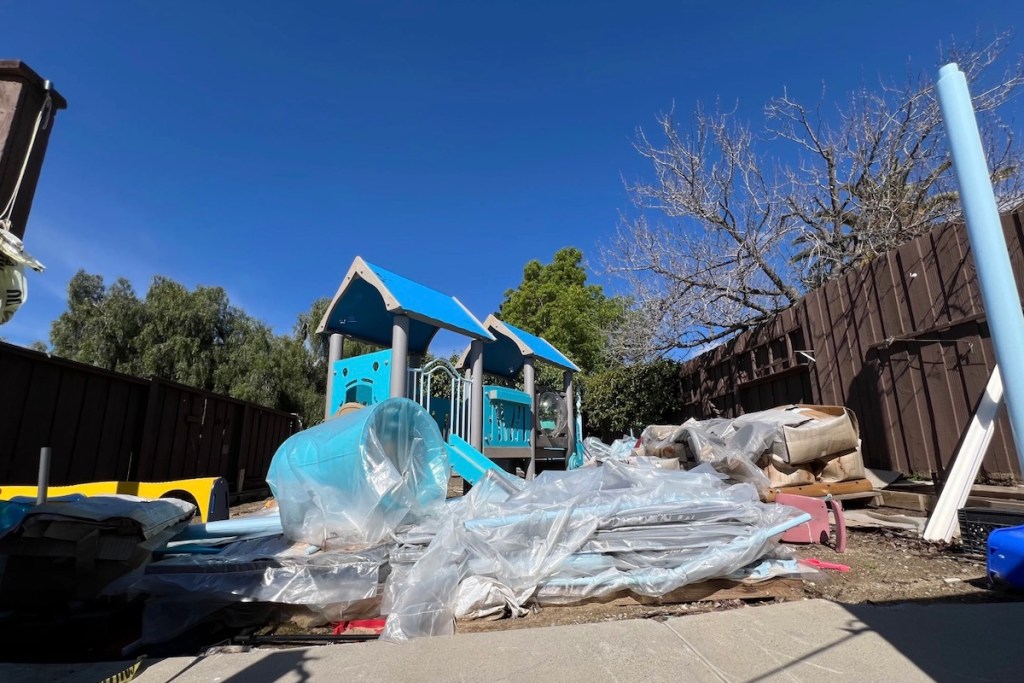Storyteller Children’s Center, which provides early childhood education and much more to children living below the poverty line, has been struggling for months to obtain the city’s approval to install a toddler playground it procured with grant funding. Despite best intentions and efforts, its attempts to move forward have been stymied, and with the old, dated equipment demolished, the children are left with an empty playground.
When Storyteller removed the old playground equipment and began installing new play equipment last August at its 2115 State Street location, neighbors complained that the shade screen poles could be seen from behind the fence. A couple neighbors claimed the equipment needed to be more muted in color.
Even though the playground area is in the rear of its property, not visible from the street, Storyteller paused the work. Shortly thereafter, the city red-tagged the property and on September 12 posted a Stop Work Notice, which stated that the playground was being altered without a permit.
Storyteller — led by board members, including real estate investor Kenny Slaught — had not sought a permit because from the board’s reading of the city’s code, one was not required. This was confirmed by its playground vendor, Play & Park Structures, which does removals and installs across the country and advised the board that a permit is never required for a replacement toddler playground. The equipment is for children 6 to 23 months in age.
When presented with the Stop Work Notice, however, Storyteller was eager to comply and immediately inquired what type of permit is needed, but according to Storyteller representatives, the city would not specify.
In the meantime, Storyteller sought to remove the shade screen poles because of concerns voiced by neighbors. However, the city would not allow the removal without a demolition permit, which in turn Storyteller was not allowed to apply for until the city issued a Notice of Violation.
On October 20, the Notice of Violation was issued, stating that a building permit is required to install the new equipment. While Storyteller hired a consultant to work through permit needs, the city communicated that accessibility requirements must be met and recommended that Storyteller hire a Certified Access Specialist to assist them with this.
According to Storyteller’s project team, there are no accessibility requirements for toddler playgrounds, but given the city’s insistence, Storyteller hired a Certified Access Specialist to prepare an assessment. The report, obtained on February 28 and submitted to the city the same day, confirmed that because the playground is for toddlers under the age of 2, there are indeed no accessibility requirements. The permit planner and Access Specialist added nearly $20,000 to the project.
What Storyteller seeks to do, according to Executive Director Dr. Gabriella Garcia, is replace an inaccessible sand surface with an accessible, resilient, and safe play surface. Each structure and the surfacing of the new playground are accessibility improvements from the old, sand-based playground.
One of the many positive outcomes of the playground, she shared, is that it will not only be fun and joyful, but also easier for all people to move around in. “There’s a science behind this, with the equipment designed to develop a host of skills through play — physical, social-emotional, sensory, cognitive, and communications skills,” added Garcia. “Even the colors are rooted in trauma psychology research.”
When asked about the accessibility requirement for this story, the Community Development Department Building & Safety Code Compliance Supervisor handling the matter stated that he did not realize until he received the accessibility report on February 28 that occupancy of the playground would be by toddlers under the age of 2. Given this, he stated, the proposed install will not trigger accessibility requirements.
According to him, two more issues still need to be resolved: the removal of small trees and bushes and any issues related to the shared easement status of the land on which the playground sits. Storyteller has submitted information regarding these issues and is hopeful that this will satisfy the city.
What’s needed, according to Slaught, is for everyone to get together and work together so that the children can have a playground. Slaught related that he is used to encountering obstacles in the development process, but what’s different here is that the terrible harm is borne by disadvantaged preschool children, who are left with an empty playground.
Storyteller, which has been at this site for 25 years, is a therapeutic preschool where all children come from families living below the poverty line. Last year, 82 percent of the children had single parents, and some were homeless. Storyteller also provides comprehensive support services for families.
“Storyteller has been a beacon of social change at this location for nearly three decades,” emphasized board co-chair Erinn Lynch. “It is our hope that the city process is not misused by a few neighbors who may not want to coexist with the normal operations of a school. These young children already endure challenges and adversity. Many face housing insecurity and a lack of place to call home. To attempt to limit their play spaces and the joy of outdoor play — it’s shortsighted. It’s not what this community is about.”
A dedicated, well-intentioned board and staff, a generous funder, and parents all hope that these toddlers, all living below the poverty line, will be able to get their new playground equipment soon.

